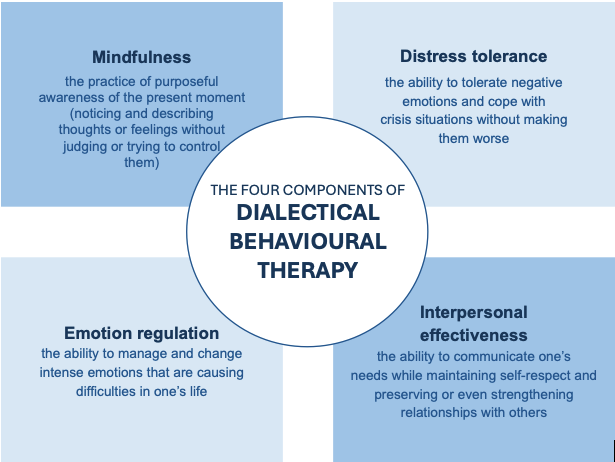What is Dialectical Behaviour Therapy?
Prepared by: Fei Ying and Dalainey Drakes
Dialectical behaviour therapy (DBT) was developed in the 1980s by Dr. Marsha Linehan (Professor Emeritus, University of Washington and Director Emeritus, Behavioral Research and Therapy Clinics). Rooted in cognitive-behavioural theories and techniques, DBT emphasizes the need to balance the seemingly opposing forces of acceptance and change. The primary “dialectic” within DBT involves acknowledging the validity of one’s experiences and emotions while simultaneously recognizing the need to decrease unhelpful behaviours and move towards “a life worth living”. DBT was originally created as an intervention for people living with chronic suicidal ideation and borderline personality disorder. Today, DBT has been recognized as an effective treatment for emotion dysregulation more broadly and for use with many other psychological conditions.
Comprehensive DBT programs often involve individual therapy, group-based skills training, as-needed telephone coaching between sessions, and extensive consultation between an interdisciplinary care team. However, many components of DBT have been adapted and used for psychoeducation and treatment outside of the full protocol. The four primary areas of DBT skills are:
A growing body of research suggests that DBT, when it aligns with client goals, should be the treatment of choice for individuals with severe emotion dysregulation. These include individuals with borderline personality disorder and co-occurring substance use, posttraumatic stress, suicidal ideation, and self-injurious behaviours. Although research on the efficacy and effectiveness of DBT for other disorders is still emerging, at least one randomized controlled trial has demonstrated the effectiveness of DBT for treatment-resistant depression, bipolar disorder, and eating disorders (see Behavioral Tech Institute for full list of studies).
-
Harned, M. S. (2022). Treating trauma in dialectical behavior therapy: The DBT prolonged exposure protocol. Guilford Press.
Koerner, K. (2011). Doing dialectical behavior therapy: A practical guide. Guilford Press.
Linehan, M. (1993). Cognitive-behavioral treatment of borderline personality disorder. Guilford Press.
Linehan, M. (2014). DBT Skills training manual (2nd ed). Guilford Press.
Linehan, M. (2014). DBT Skills training handouts and worksheets (2nd ed). Guilford Press.
McKay, M., Wood, J. C., & Brantley, J. (2019). The dialectical behavior therapy skills workbook: Practical DBT exercises for learning mindfulness, interpersonal effectiveness, emotion regulation, and distress tolerance. New Harbinger Publications.
Rathus, J. H., & Miller, A. L. (2014). DBT Skills manual for adolescents. Guilford Press.


